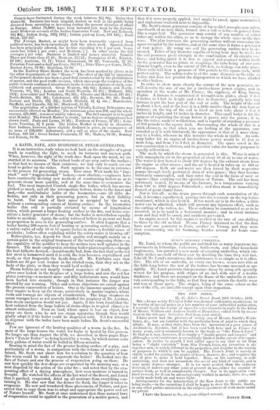. THE NEW JOINT.
57, St. John's Street Road, 20th October, 1859.
SIR—As my newly Patented Joiht was deemed sufficiently meritorious to be worthy of special notice in a lute number of your influential publication, I venture to ask the favour of space for a few remarks in reply to the letter of Messrs. William and Andrew Smith of Mauchline, called forth by an ex- tract in the Glasgow Saturday Post from your article. I have never had the pleasure of seeing any of Messrs. Smith's Work- boxes, &c., but am familiar with the particular form of joint to which they allude. It may, as they state, have been the invention of a poor joiner of Auchinleck, Ayrshire, but it has been used both here and in France for many years, and is commonly known to the trade as "the French Joint." Be that as it may, however, it is simply a " double groove and tongue," and although a neat contrivance is exceedingly limited in the extent of its appli- cation. In justice to myself, I feel culled upon to say that so far from being a "slight variation" from this French Joint, my invention is al-- together new, is widely different in its properties, and singular in the variety of purposes to which it can be applied. The French Joint is merely or chiefly useful for joining the angles of boxes, drawers, &c., and requires the aid of glue to make it hold together. Mine, on the contrary, is self- sustaining, and does not necessitate the use of any kind of cement, and is very many degrees stronger. It is far more perfect than the ordinary dovetail, or indeed any other joint at present in use, either for angular or surface work, as well as considerably cheaper. Nor is its application con- fined to wood, for it can be advantageously worked in metals, slate, &c., and is easily made both air and water tight.
Arrangements for the introduction of the New Joint to the public are being made,—in the meantime I shall be happy to show the Messrs. Smith, or any other parties interested in the subject, specimens of work made under my patent. I have the honour to be, sir, your obliged servant,
JOSEPH HIM


























 Previous page
Previous page